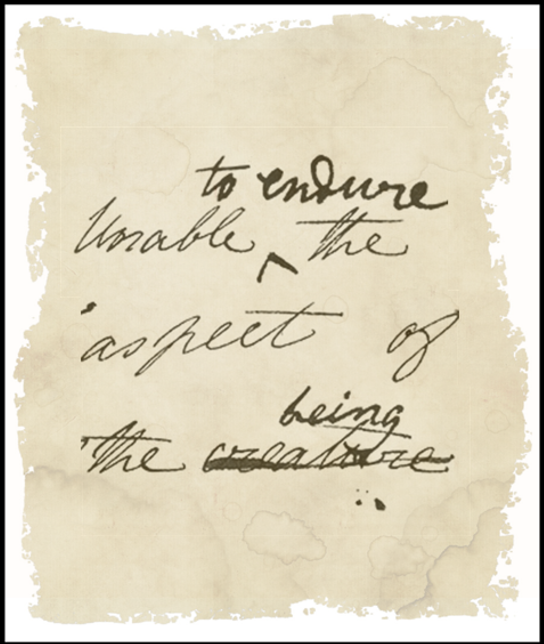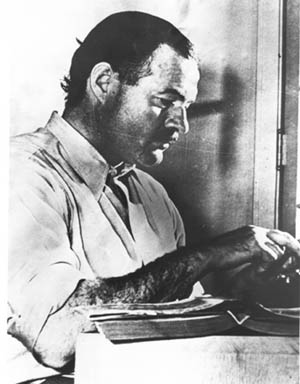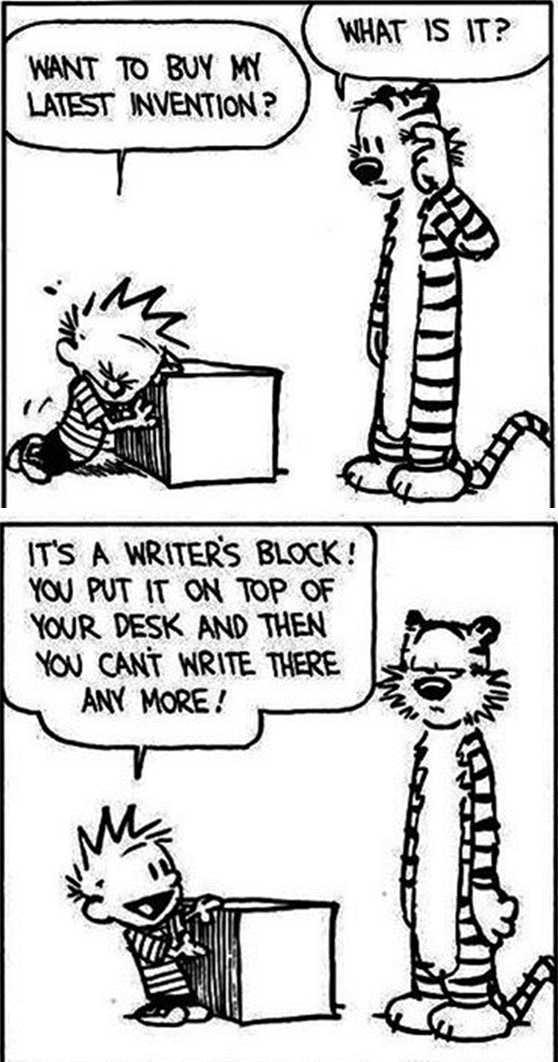 For Mark Twain, “The difference between the right word and the almost right word is the difference between lightning and a lightning bug.”
For Mark Twain, “The difference between the right word and the almost right word is the difference between lightning and a lightning bug.”
For Mary Shelley, it is the difference between creature and being. We can see her deliberation in the excerpt (at left) of her Frankenstein manuscript, where she makes a choice that best reflects the book she intends to write. For her, the novel’s artificial human was not simply a creature. That word, which means something created, usually refers to animals. Being, however, suggests something more, perhaps not a human being but something equal in stature. It’s an important distinction and one that contributes significantly to the novel’s overarching themes.
Of course, it’s easy for us to see the wisdom of that choice. The book is fully formed. The story is known. But for the author, setting out to write a story that was still taking shape in her mind, it must have been a daunting task–one not unlike the one faced by today’s young authors as they attempt to funnel their thoughts into their as-yet-unwritten compositions.

A few days ago, I had the opportunity to meet 24 such writers when Dr. Wayne Brinda invited me to visit one of his undergraduate writing classes at Duquesne University. In addition to teaching at the university, Dr. Brinda is also the Producing Artistic Director of Prime Stage Theatre, the company that releases my Mystery Theatre podcast and, this November, will stage my all-new adaptation of Mary Shelley’s Frankenstein.
While visiting the class, I invited the students to submit statements about their career goals along with questions about the writing process, and in the time allotted, I managed to address most of those.
However, since a few questions remained unanswered when the class ended, I promised the students to respond to their remaining ones in a blog post. So … let’s get to it.
 I really struggle with thesis statements. I just don’t understand them. I want to pursue a career in construction one day.
I really struggle with thesis statements. I just don’t understand them. I want to pursue a career in construction one day.
I’m intrigued by the way your intended career provides a ready-made metaphor for your current struggle.
To wit: writing an essay is a bit like building a house. It’s all construction, after all. And an essay without a clear thesis statement is like a house without a well-designed point of entry.
Consider, for example, the image at left. It’s from WritingScape.com, a website that bills itself as “your helpful guide to writing styles, grammar, punctuation, sentence structure, organization, and essay writing.”
WritingScape’s article “How Building an Essay is Similar to Building a House” does a nice job of fleshing out the construction metaphor.
For me, when designing a thesis statement, I try to keep in mind that writing an essay is not a linear process. As in construction, designs change as the building moves from preliminary sketches to blueprints, and they continue to evolve to address concerns that might arise along the way … which brings us to our next question.
 I’m a Spanish pre-law major. I plan to go to law school and get involved in prison reform. How do you expand your vocabulary to help paraphrase/rewrite sentences?
I’m a Spanish pre-law major. I plan to go to law school and get involved in prison reform. How do you expand your vocabulary to help paraphrase/rewrite sentences?
Ernest Hemingway famously said, “the only kind of writing is rewriting.” In other words, you would no more expect a family to inhabit the preliminary sketch or blueprint of a house than you would anticipate a reader to fully grasp the points in the first draft of an essay.
Hemingway once told the Paris Review that he rewrote the ending of A Farewell to Arms 39 times. When his interviewer asked him why so many times, he responded that he was “getting the words right.”
Naturally, “getting the words right” requires a good working vocabulary, and one way to build that is to consider alternate word choices as you write. Use the synonym function in your word-processing program, but don’t trust that every word it gives you will be right for the job. Go one step further by checking the connotations and denotations of each word in a good dictionary. Then read your sentence out loud to try out the word’s sound as well as meaning. It’s a good way to build your word power while working on an essay assignment.
Incidentally, Hemingway’s claim of 39 revisions now seems to be an understatement, since his grandson has since discovered no fewer than 47 revisions among his grandfather’s papers. You can learn more about that discovery here.

How do you get out of writer’s block? What encouraged you to be a writer? Do you work better organized or chaotic (like me)? I want to be an editor of political science articles.
I think what a lot of people call writer’s block comes from a sense that writing is only about the act of putting words on a page. It isn’t. Writing is everything the writer does. It’s hanging out with friends, falling in love, facing hard times, going to work, getting in and out of trouble, raising a family, and all the other things that some new writers tend to regard as distractions.
But they aren’t distractions. They’re part of writing because everything a writer does contributes to the craft. Writers who find themselves staring into space and waiting for inspiration might consider getting up and reentering the fray. Ideas come from life. At least, that’s how it’s always worked for me.
So, yeah–life may be chaotic, but it’s that chaos that encourages and informs what we write.
I love Frankenstein. Why did you choose to adapt the story?
It was Dr. Brinda’s idea. He approached me about the project in the fall of 2019. It was an offer I couldn’t refuse. Like you, I love the novel.
So that’s it. I believe that’s all the questions that were left at the end of our session. If you were in the class and you know of any questions I missed or if you have any additional ones you’d like to ask, please post them below or reach out via the media links at the top of this page. Likewise, if you weren’t in the class and have a writing question, please send it along. I’ll try answering as many as I can in an upcoming post.
Until next time … keep writing!

Leave a Reply